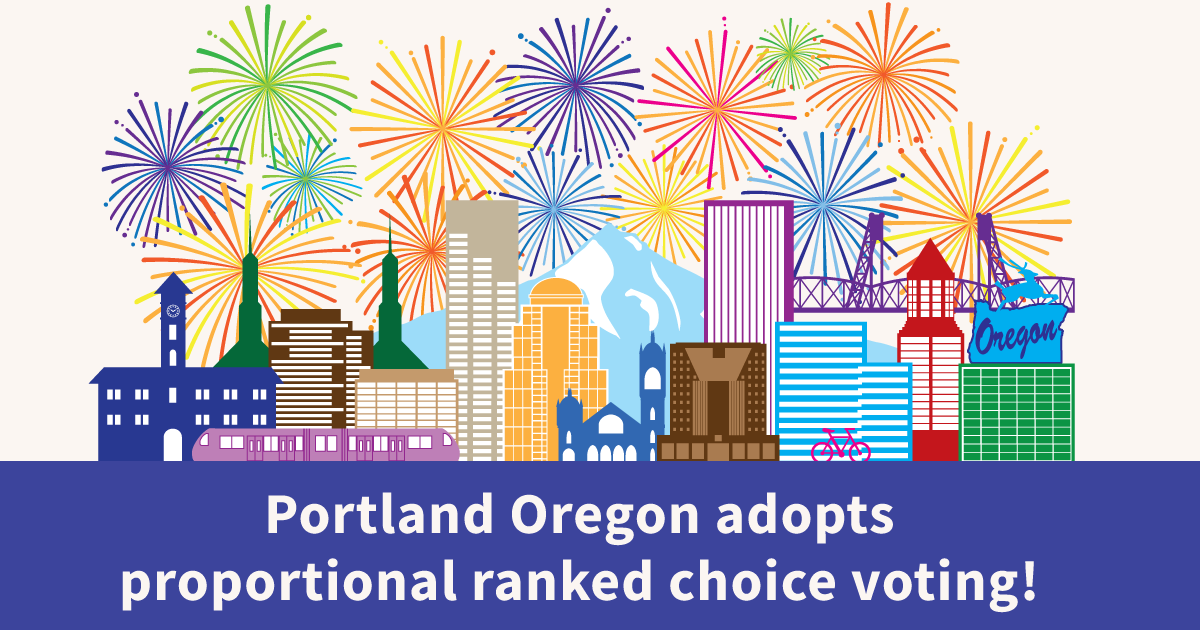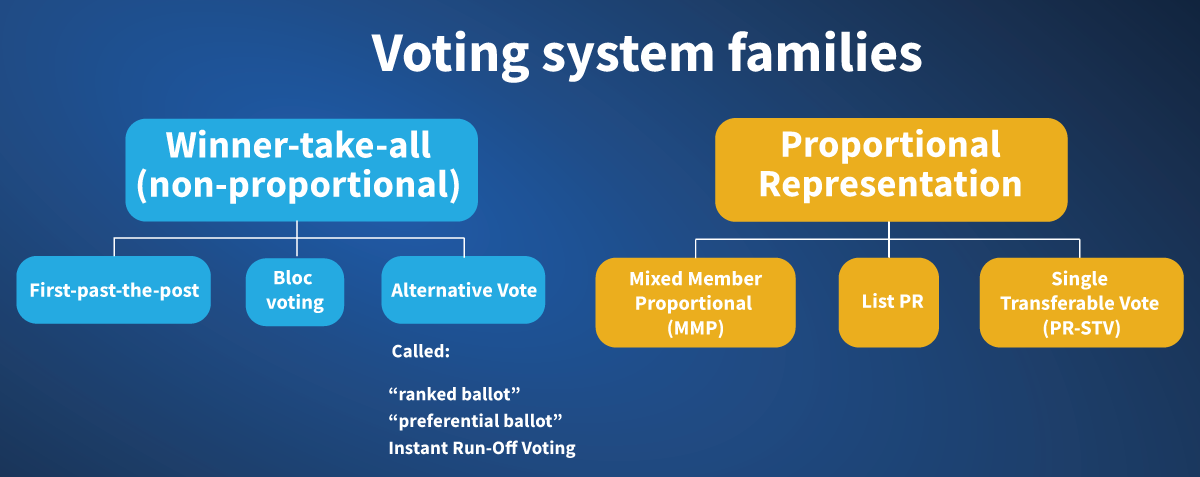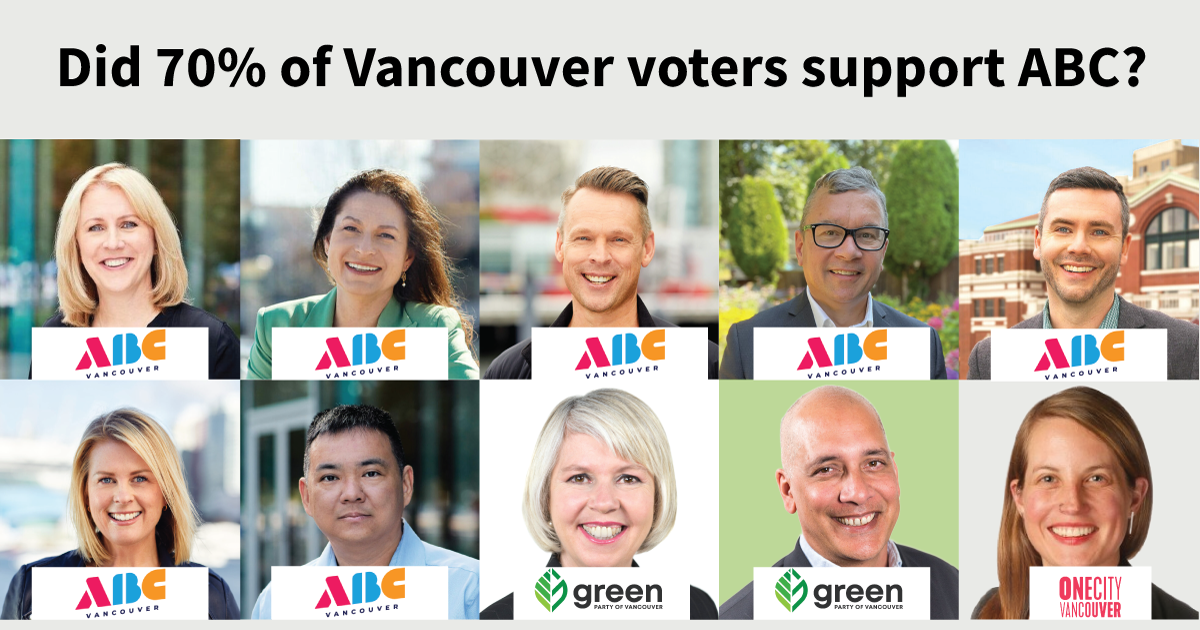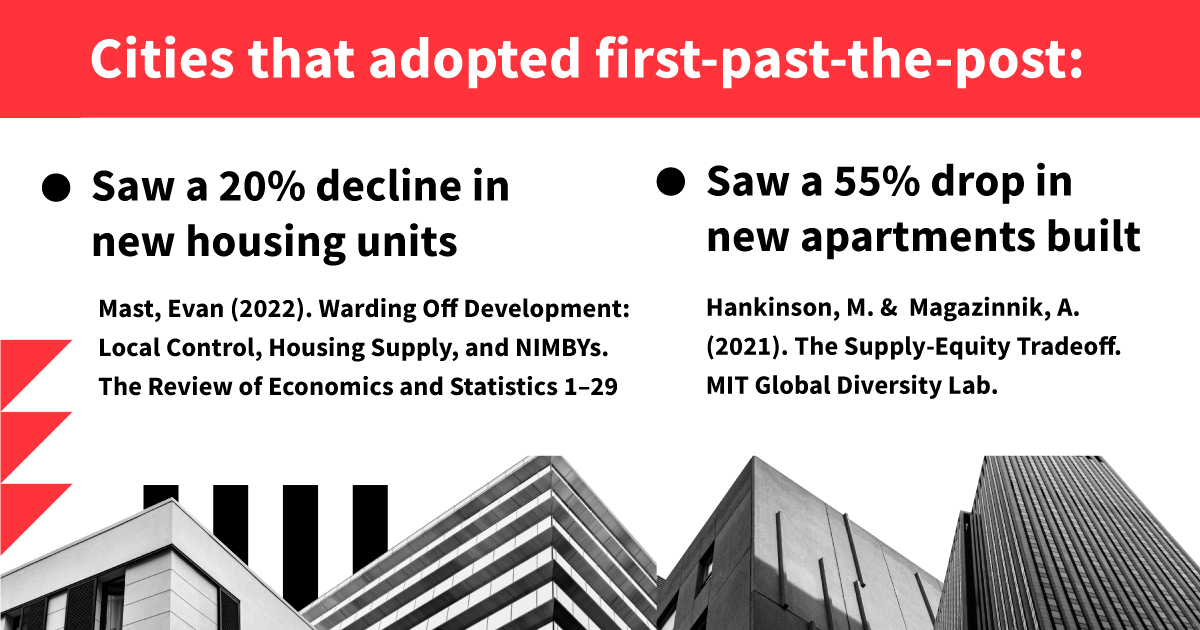
Portland Oregon just voted to adopt proportional representation for city elections. For local voters, it’s a huge leap forward.
In an era of democratic decline and a frightening rise in support for authoritarian government, some cities are spearheading changes to empower voters and help restore citizens’ trust in government.
Voters in Portland Oregon chose today to adopt proportional ranked choice voting, also known as Single Transferable Vote (PR-STV).
The win for PR-STV followed a recommendation by the Charter Commission, a group of 20 citizen volunteers appointed by Portland’s City Council. The Charter Commission spent a year researching and consulting citizens. They recommended proportional ranked choice voting as a way to make Portland’s elections more democratic and their government more responsive and effective.
The Charter Commission’s recommendation was backed by forty local groups, including the Coalition for Communities of Colour, the NAACP, Business for a Better Portland, and the Portland Association of Teachers.
Portland becomes the seventh city in the US to use proportional ranked choice voting currently or who have recently adopted it for future elections. It’s also used in Scotland, Ireland and a growing number of cities in New Zealand.
Proportional ranked choice voting allows citizens to rank their choices in order of preference. Unlike Instant Run-off Voting, where ranked ballots elect a single winner, PR-STV ensures that more than one candidate is elected in each race―providing far more voters with effective representation.
Instant RunOff Voting is just a tweak on first-past-the-post―it’s another winner-take-all system. At the federal and provincial level, it could produce results even more distorted than first-past-the-post.
Proportional representation works to make every vote count.

With proportional ranked choice, voters elect several representatives in multi-member wards.
This means different groups of voters and points of view are fairly represented at City Council.
Local government decisions will take into account the views of voters of different political persuasions, while also ensuring fairer representation from the city’s neighbourhoods.
The outcomes of a proportional ranked ballot system are far superior to the usual “winner-take-all” approach to municipal elections (and every other election) in Canada.
Vancouver elections rife with problems
Vancouver’s 2022 election was a poster child for electoral dysfunction.
With winner-take-all bloc voting, a single slate with a minority of voter support swept 70% of the seats. Voter turnout fell to 31%.

Calls for change in Vancouver are gaining momentum
In 2016, Vancouver City Council created an Independent Election Task Force, composed of citizens. The Task Force did the same kind of hard work done by the citizens on Portland’s Charter Commission.
The report of the Task Force recommended proportional representation for Vancouver, with a Vancouver Citizens’ Assembly to engage residents to choose the model.
So far, their recommendations for a Citizens’ Assembly have been set aside by Vancouver City Council.
To change the voting system in Vancouver and other municipalities, the BC provincial government needs to amend provincial legislation to give all cities the ability to choose their own voting systems. Similar local choice legislation was introduced in Ontario in 2016, then rescinded when Doug Ford’s Conservatives came to power in 2018.
Despite being petitioned by the City of Vancouver, the BC NDP (and BC Liberal governments before them) have failed to respond.
This wall of silence amounts to a tacit endorsement of winner-take-all politics. It’s yet another failure by the major parties to embrace an evidence-based approach to electoral reform.

Single member wards would worsen Vancouver’s housing crisis
In the last Vancouver municipal election, several candidates wanted to “fix” Vancouver’s problems by adopting single member wards: first-past-the-post.
In a city struggling with democratic disengagement and beset by a housing crisis, first-past-the-post and single member wards would be the worst possible option.
Research by Evan Mast at MIT, published in the Review of Economics and Statistics, looked at housing growth rates in 238 cities that recently switched to winner-take-all single member wards.
His research found that cities which adopted single member wards suffered a drastic decline in new construction.
After two years, cities using single member wards had 20% fewer new units than those using multi-member wards (such as those used with proportional ranked choice voting), especially in whiter and higher-income areas.
Other research from George Washington University and MIT confirmed this trend, finding a 55% drop in new apartments built in cities that switched to single member wards.
Having only one councillor per ward fuels a not-In-my-backyard mentality that makes it even harder to get affordable housing built and could exacerbate the housing crisis.
The costs and benefits of developments are not distributed uniformly within a city. With single member wards, each councillor prioritises vocal minorities opposed to a given project in their own district over the needs of the city as a whole. Housing is not the only issue that gets neglected either.
As Michael Andersen and Jay Lee of Sightline Institute point out:
“Hyperlocal costs, citywide benefits. It’s a lot like the politics of a homeless shelter, a waste transfer station, or a bus lane that would displace a parking lane. And when a council has many small districts, each with a single member attuned mostly to swing voters in their district, the citywide benefits of local change can get lost.
A bunch of single-winner wards seems to be a formula for a city that misses the forest for the trees.”
Time for real democracy at City Hall
Any proportional system tailored for Vancouver, including proportional ranked choice voting or Mixed Member Proportional (using a mix of single member and at-large seats), would profoundly improve the quality of democracy for citizens.
Proportional representation would:
– provide the vast majority of voters with a city councillor they helped elect―making almost every vote count
– increase the diversity of voices representing each neighbourhood
– help improve the racial diversity of city council
– ensure election results reflect the will of voters
Will the new Vancouver City Council push for evidence-based reforms that will help alleviate the now critical housing crisis? It’s time for the government of British Columbia and Vancouver City Council to show leadership and put the needs of residents first.
References
Angus Reid (2022). Democracy in North America: Significant segments in Canada, U.S. open to authoritarian leadership.
Anderson, Michael and Lee, Jay (2022). When cities switch to one-winner council districts, housing growth plummets. Sightline Institute.
Caballero, Lisa (2022). Endorsements, money and strategy: A look at the charter reform horse race. Bike Portland.
Fair Vote USA. Where is proportional RCV used?
Gronke, Paul (2022). Proposal for new Portland council and way of voting would mark another step forward. Oregon Capital Chronicle.
Hankinson, Michael and Magazinnik Asya (2021). The Supply–Equity Trade-off: The Effect of Spatial Representation on the Local Housing Supply. Conditionally accepted in the Journal of Politics.
Mast, Evan (2022). Warding Off Development: Local Control, Housing Supply, and NIMBYs. The Review of Economics and Statistics 1–29.
Sightline Institute (2022). Portlanders have an opportunity to change how their city hall works.
